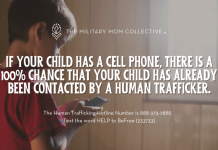As a military spouse, I’ve been conditioned to expect bumps in the road. Changes are inevitable, everything is taken with a grain of salt, and nothing is official until it’s in the rear view mirror. I’ve come to take pride in rolling with the punches and in moving forward despite the challenges.
But that day — that day, I was stopped dead in my tracks.
My husband mercifully flushed what I instinctively knew was the end of my pregnancy, and I crumpled into a heap on the bathroom floor unable to move, think, or feel. That day, as the the night sky held the final moments of my 27th birthday, I felt as if the darkness would fail to lift. How could the sun rise again? That day, I became a statistic—part of the 1 in 4 pregnancies that end in miscarriage or stillbirth. Although I couldn’t have imagined it then, just three months later I would become one of the 2% of women who experience two consecutive miscarriages.
In the years that have passed, I have watched other friends and loved ones suffer the same life-altering loss. And while profound pain is inevitable, I have come to learn that every situation is unique.
No two stories are the same, and no two women grieve alike. And yet, it’s important to understand the various ways in which these situations occur because, all too often, our support systems are just as paralyzed as we are in the midst of a miscarriage.
They are afraid of doing or saying the wrong things. They want to help, but they don’t know how. Having a general understanding of what women experience during a miscarriage helps to alleviate that fear.
For the military spouses in your life, it’s important to be aware of the following:
Our Losses Almost Always Coincide with Other Major Life Changes
Military life is a never-ending cycle of change. Whether gearing up for a deployment, adjusting during reintegration, or anticipating an upcoming move, medical and emotional crises are often thrown into an already messy situation. It can be difficult to grieve or fully comprehend a pregnancy loss when simultaneously dealing with other major life changes. In the short term, this can be a relief—in much the same way, I suppose, as parenting a toddler during a crisis.
You are simply too busy to fall apart.
You have no other choice than to keep putting one foot in front of the other. In the long-term, however, this can have devastating consequences on one’s mental health.
Both of my losses occurred during the PCS cycle. With the second, we were living at my in-laws for an extended period of time as a long-term training fell between the two duty stations. While we were lucky to have love and support so readily available, it was difficult to cope with a major loss during such a huge transition.
I vividly remember stifling my sobs late at night, fearing that family members might hear. I found myself hiding pregnancy tests that I took in the days following a “threatened miscarriage” diagnosis, hoping against hope that the doctors had been wrong and my HCG levels were still rising.
Miscarriage will make you crazy. It will take your logic and bend it backward—and that’s OK. But feeling oneself become unhinged in the presence of others, without a safe retreat, makes the experience all the more terrifying.
Of course, being in transition always comes with logistical hurdles. Being outside of our insurance region during a medical crisis became a serious issue. It took time to find a facility that would accept our insurance. Even then, we were allowed only two non-emergency visits before returning to our geographic region—a logistical nightmare when moving from an overseas location back to the United States.
Even upon arriving at our new duty station, mere days removed from the initial loss, the medical care needed to ensure my HCG levels safely returned to normal was not easily attained. In-processing takes time, you know. Nobody expects an ongoing medical crisis to accompany an intercontinental move.
Of course, nobody expects to lose a pregnancy, either.
Continuity of Care is a Rare Luxury
By the time my second loss was fully resolved, I had visited four different facilities in two states. Each visit required a new explanation of the still-fresh trauma, each examination conducted by a complete stranger.
There was nobody to rely on with a comprehensive understanding of my medical history—outside of general office paperwork, at least. There were no credible reassurances that these losses were simply anomalies and that I would, in time, experience a healthy pregnancy. That’s a luxury we simply are not afforded in this life. But it is an odd feeling, indeed, to experience something so intimate and painful in the presence of total strangers.
Even in the best of times, military families rarely have more than a handful of years with the same medical professional. So if you are a woman who has experienced pregnancy loss, it can be difficult to convey your fears over a new pregnancy.
There is an exhaustive regurgitation of medical histories that occur with every new doctor. Because of this, your miscarriages follow you like a shadow from which you are unable to extract yourself. Your grief, no matter how old, hits anew every time you are asked, “How many pregnancies have you had?”
You answer.
Then the inevitable, “How many live births?”
It’s always uncomfortable. It always cuts open the wound, at least a little—enough to let long-rested memories resurface again. It’s a dance between past and present that follows us with a regularity that our non-military counterparts generally do not have to face.
Distance Compounds the Difficulties
Less than one week after my second loss, we found ourselves transitioning yet again. Our temporary time with family had ended, and our car was packed to the brim for a 14 hour trek to our new home. On the way out, I was lucky enough to have a final goodbye with some dear friends who were careful to comfort me in my pain. And those hugs—those real, tangible hugs—meant the world to me. For people like us who so often experience the highs and lows of life via some form of technology, this opportunity was meaningful beyond measure.
It also was fleeting.
Before we knew it, another phase of life had begun. New friends were quickly made. A new house was carefully crafted into a home. And yet, time felt suspended somehow—as if moving on so suddenly was inappropriate. But what other choice was there? Pregnancy loss isn’t generally a great conversation starter.
Over time, this stark discrepancy between the recent past and my current reality began to weigh heavily on me. It felt as if everyone besides me had forgotten. There were no coffee dates with a dear friend just to check up on my well-being. There could be no family get-togethers with gentle hugs and knowing looks.
The reality is, acknowledging somebody’s loss can be extremely uncomfortable. People simply don’t know what to say; so, in real life, that non-verbal communication becomes essential. It says, “I’m sorry for your loss. I’m here for you,” even when the words themselves fail. That’s an experience we military spouses are often deprived of. And it’s a gaping one that can leave wounds exposed.
So if you know a military spouse who has experienced pregnancy loss, speak up. Say something. Anything. But make sure she feels your presence—with a text, a quick call, an encouraging message. Just don’t let her feel forgotten; because she needs you, even if she can’t be with you.

When I think back on my miscarriages, the thing that strikes me most is the feeling of losing control, of having my body rebel against the natural order of things. It shook me. It is the scar that still aches all these years later. And, as a military spouse, perhaps that’s not surprising. Our lives are so often out of our control. It’s a reality we are conditioned to accept. It’s the life we have chosen. But nothing can prepare any woman for the loss of control that happens with a miscarriage. It’s life-changing and requires a tremendous amount of support from friends and family in order to heal.
Although military spouses face unique challenges when dealing with pregnancy loss, it’s important to remember that every woman who experiences a miscarriage suffers.
Grief needn’t be competitive. It exists and that’s enough—enough to bind us together, all of us unwitting statistics.
Each loss is different and must be approached with sensitivity and care, but simply taking the time to learn about the process and extend a kind thought is a step in the right direction. Navigating this winding road isn’t something any of us asked for, but having our loved ones acknowledge the journey sure makes it feel less lonely.











